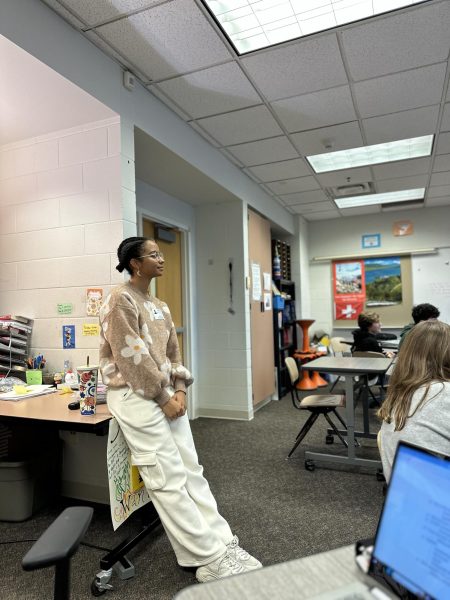Insightful, fun and moving are the three adjectives German speaker Chantel Anderson used to describe her experience at SPA. “I saw the senior speeches, and they really touched me,” Anderson said. Through the senior speeches, she witnessed the power of connections that formed between the seniors and the rest of the student body.
Chantel Anderson, a senior at The Catholic University of Eichstätt-Ingolstadt in Germany, was invited through the German for Hire program under the Goethe Institut to visit the Middle and Upper School German classes from Nov. 8-10.
Anderson loves connections, whether that’s with people or animals. She grew up on horseback because of her mom, a horse lover who had set Anderson up on the saddle when she was just a child. “I love developing the connection with the horse more than the sport itself,” Anderson said. Anderson values making connections with the world around her, and this stretches more than her hobby for horse riding.
Anderson started learning English in fourth grade and continued learning in high school and college. Today, she is fluent in both English and German. Her desire to establish a global perspective through meaningful interactions across multiple cultures motivated her to pursue other languages as well. Anderson has also taken Italian throughout middle and high school, two semesters of French, and three semesters of Japanese in college.
I love talking to people and in whichever culture. There are so many attached to a region more than the language. It kind of opens up the world for you.
— Chantel Anderson
“I love talking to people and in whichever culture. There are so many attached to a region more than the language. It kind of opens up the world for you,” Anderson said. Anderson bridges the gaps across cultures by breaking down the language barriers and wishes to establish the same for students.
Many U.S. high schools’ language departments lack the finances and opportunities to supply their language students to study abroad in Germany. Due to this limitation, Goethe Institut was founded as a non-profit helping students worldwide increase their curiosity for German culture, providing them with an immersive experience learning the German language.
“I love the idea of getting to meet people and seeing what school life is like in America. I was interested in the U.S. so [as a graduation requirement] I applied for [internship] places within the U.S., and Goethe Institut accepted me as the ambassador,” Anderson said.

German for Hire is one of the many programs that Anderson has to complete during her internship at Goethe Institut. Besides German for Hire, the Goethe Institut organizes various programs to fulfill its objectives. These include free cultural events celebrating German holidays and history. The International German Olympics is another initiative, an online green-city sustainability contest for American students to eventually win a funded trip to Germany.
There are as many as twenty dialects in Germany, and Anderson introduced students to the Bayrisch dialect of Bavaria and other southern German holidays and traditions. Bayrisch doesn’t have an official form of writing to it. While German students may speak the dialect at home, only the standard German is taught at school.
“It felt like re-learning the language. You have German, and then you have Bayrisch. It’s like culture within a culture and learning how those intermix. They have slight similarities yet are unique under the same core thing,” Senior David Kopilenko said.
Anderson engaged with the lower-level German classes by asking follow-up questions as they introduced themselves and their hobbies in Bayrisch. “For the lower-level students, I sometimes used English loanwords and explanations along [with] German. But the aim of [it] is so that they get to hear native speakers and how I pronounce them. For the Advanced Level, I speak quickly, very true to how I would talk to another German,” Anderson said.
In addition to learning the Bayrisch dialect, Advanced German also presented slides about Minnesota, contrasting the two cultures. “My group slide was state fair, and other groups talked about hockey, safety services and nature,” Kopilenko said.
Anderson experienced the ‘Minnesota nice’ while spending her week in St. Paul. She enjoyed every moment of supporting the Spartans, and Anderson would like to give a thank you message, appreciating the opportunity to work with students.